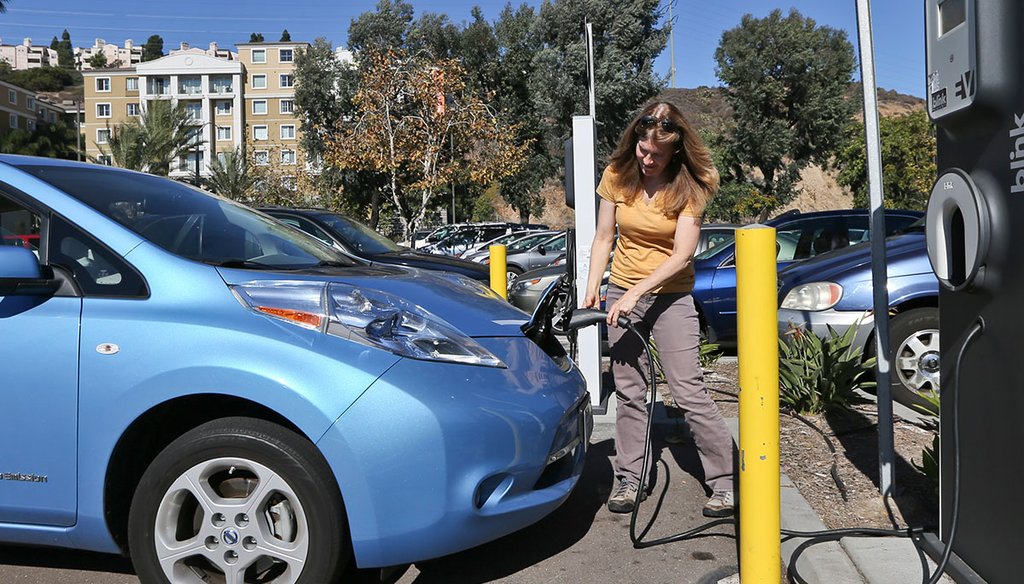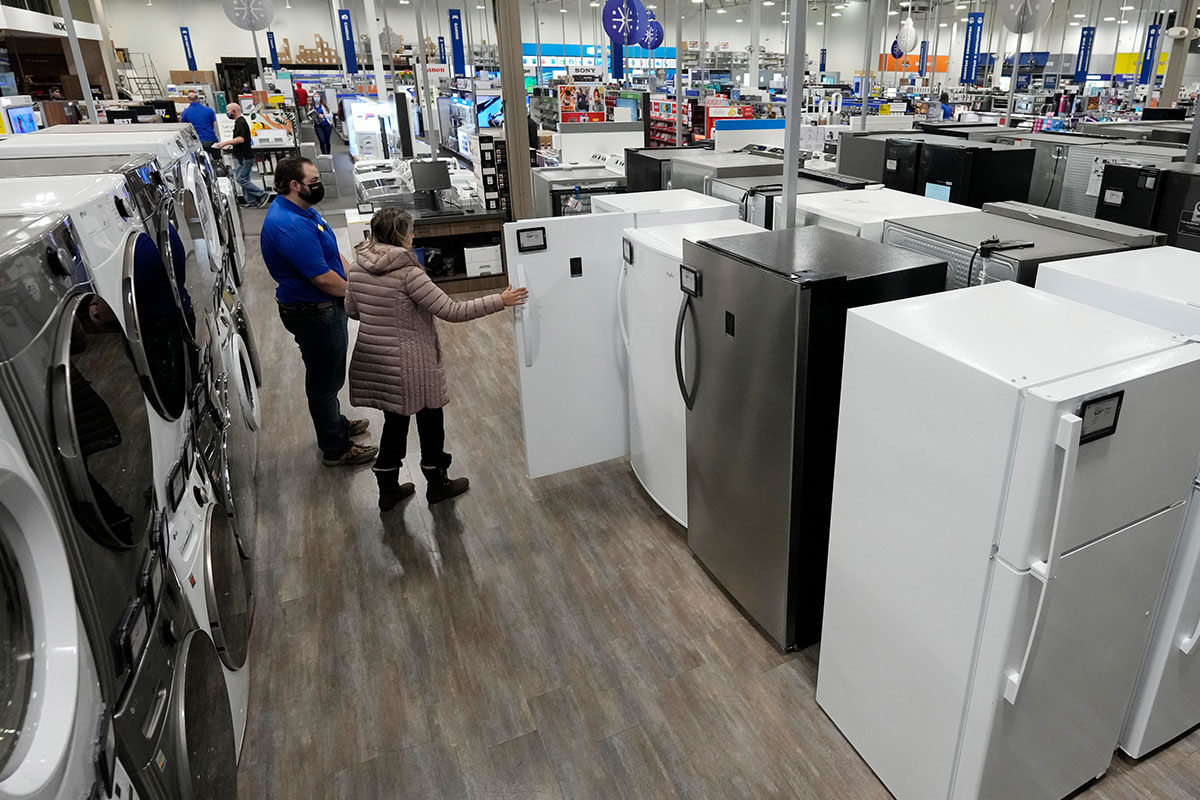Stand up for the facts!
Our only agenda is to publish the truth so you can be an informed participant in democracy.
We need your help.
I would like to contribute

Angie Vorhies plugs in the charging cord to her Nissan Leaf electric vehicle at a mall Nov. 13, 2013, in San Diego. (Lenny Ignelzi/AP)
If Your Time is short
-
It’s difficult to compare electric vehicles and household appliances, as many variables distort the calculation: What kind of fridge? What kind of car? How much is the household driving?
-
But based on one car, one car charger style and one type of refrigerator, two electric cars might use about 7.6 to 19 times the electricity annually as a refrigerator.
President Joe Biden has called for 50% of all cars sold in the United States to be electric by 2030. The Inflation Reduction Act aims to help that goal by including a $7,500 tax credit to encourage Americans to buy electric cars.
In a July 19, 2022, House hearing, Transportation Secretary Pete Buttigieg lauded Biden’s goal as possibly bringing cost-saving technology to rural communities and fighting the climate crisis.
U.S. Rep. Thomas Massie, R-Ky., however, countered that he was "alarmed" at "the naiveté" in Biden’s proposal, given the current electric grid’s capacity to accommodate electric cars. He asked Buttigieg whether more Americans charging electric vehicles would strain the grid.
Massie, a Massachusetts Institute of Technology engineering graduate, practices a green lifestyle, living off the grid on solar panels and a Tesla battery. He even made a movie describing his quest for energy independence that won the 2018 Anthem Film Festival Audience Choice Award. In the hearing, he told Buttigieg he’d been driving electric cars for 10 years.
A customer looks over a refrigerator with a sales associate’s help at a Best Buy store Nov. 26, 2021, in Lone Tree, Colo. (AP)
Massie then asked Buttigieg how much electricity a charging electric vehicle might take compared with a running refrigerator, five times or 25 times.
Buttigieg said 25 times.
"It’s actually 50 (times) at the instantaneous moment, but over the course of a year … the average American household would use 25 times as much electricity for their electric car as they would use for their refrigerator if they had 100% percent adoption," Massie said, citing U.S. Energy Department numbers for households and vehicle ownership.
One hundred percent adoption would mean two electric cars per U.S. household.
We wondered whether Massie’s comparison is accurate. We emailed Massie asking for a source of his information, but got no response. We also emailed the Transportation Department for Buttigieg’s input but got no response.
Comparing electric cars with refrigerators is imperfect and complicated, said Harrison Neuhaus of Climate Nexus, a communications group highlighting climate change’s impacts.
For example, electric cars can be charged with one of three different chargers, two used at home, that charge the batteries at different rates.
"EV models can be very different — depending on the battery you have, you may need to charge less or more to get the same amount of driving range. So, we need to rely on averages," Neuhaus wrote in an email to PolitiFact. (Climate Nexus is collaborating with PolitiFact as part of a grant to cover issues related to climate change.)
Charging an electric car, such as a Nissan Leaf, takes about twice as much annual energy as a refrigerator, according to a 2017 document from the U.S. Energy Department. Using Massie’s example, then, swapping out two gasoline-powered cars for two EVs would use around four times as much electricity annually as a refrigerator. However, that document relies on 2009 data for refrigerators from the U.S. Energy Information Administration.
Transportation Secretary Pete Buttigieg speaks at an Aug. 1, 2022, groundbreaking ceremony for the New Portal North Bridge project held in Kearny, N.J. (AP)
The Energy Department also estimated that one electric vehicle requires 3.8 megawatt hours per year of energy generation. A standard U.S. home refrigerator of 20 to 25 cubic feet uses 400 to 1,000 kWh per year, or between 0.4 MWh and 1 MWh. Using those numbers, we calculated that a single EV would use between 3.8MWh and 9.5MWh more energy annually than a standard home refrigerator.
Philip Krein, a research professor at the Grainger Center for Electric Machinery and Electromechanics at the University of Illinois, said our numbers were "generic," and open to assumptions, "but are fair."
Because Massie referred to households having two EVs rather than one, the figures we arrived at would be doubled. So, two electric vehicles would use 19 times as much energy as the refrigerator on the high end of the estimate and 7.6 times more on the low end.
Not an apples-to-apples comparison
That’s less than Massie’s claim. However, if a household uses EVs more than average, or has a smaller (or larger, or older and less efficient) refrigerator than average, those numbers would fluctuate.
Krein also pointed out other factors: In a household with two EVs, "one is likely to be used almost entirely for commuting and the energy use for it will be much lower;" and refrigerators are fairly low in electrical use compared with other appliances, such as air conditioners.
Rep. Thomas Massie, R-Ky., speaks at the Capitol in Washington, Friday, June 24, 2022. (AP)
Because there are so many variables, there is no way for anyone, including Massie, to make an apples-to-apples comparison.
What about Massie’s notion that charging electric cars en masse would overstrain the grid?
Matthew Klippenstein, an engineer at the Canadian Hydrogen and Fuel Cell Association, who led an EV charger rebate program at Plug In BC, said there are many ways to prevent that.
"Long before charging becomes a threat to the grid, utilities will coordinate with charging networks or with customers directly, to streamline this stuff," Klippenstein said. "If any utility doesn’t do that, that’s not the fault of EV drivers, it’s the fault of utility management."
He added that automakers are also working to enable car owners to feed the grid as they’re plugged in, a process called bidirectional charging. This would help ease grid strain.
Also, Krein added, electric cars and refrigerators consume electricity differently.
"Not surprisingly, an electric car is a bigger grid load than a household refrigerator," Krein said.
"(And) nationally, at least 28% of all U.S. energy consumption goes to transportation. Total national energy consumption drops when transportation moves to electrical form."
Experts have affirmed that the rollout of EV use doesn’t pose a risk to the electrical grid. James Morris, editor of the independent electric vehicle website WhichEV, wrote that the chances that all Americans would charge their cars at once are "infinitesimally low.
"Their arguments seem to assume that nobody ever drives their car, and just charges it all the time," he wrote in Forbes magazine in November 2021.
RELATED: Video underestimates California’s capacity to accommodate electric cars and recycle their batteries
Our Sources
President Joe Biden: Whitehouse.gov, Aug. 5, 2022
AutoNews, Bill with revamped EV tax credit passes Senate, heads to House, Aug. 7 2022
Brookings Institution: The moment for EVs: Strategies to transform American roads, July 21, 2022
U.S. Rep. Thomas Massie, R-Ky.: remarks July 19, 2022
Email interview with Harrison Neuhaus of ClimateNexus, Aug.2, 2022
How to Geek: Level 1, Level 2, or Level 3? EV Chargers Explained, April 8, 2022
U.S. Energy Department: Electric Vehicle Charging Consumes Less Energy than Water Heating in a Typical Household, Sept. 11, 2017
U.S. Energy Department: Summary Report on EVs at Scale and the U.S. Electric Power System, November 2019
Whirlpool: Refrigerator sizes: how to measure fridge dimensions, accessed Aug.23, 2022
Kompulsa: Refrigerator Power Consumption: Deciphering The Label, accessed Aug. 23, 2022
Email interview with Philip Krien, Aug. 17, 2022
Reliant: Electricity Consumption Comparisons for Home Appliances and Electronics, accessed Aug. 23, 2022
EnergySage, "How many watts does a refrigerator use?" Jan.6, 2022
Eugene Water and Electric Board, "Is Level 1 Charging Fast Enough for You?" Nov. 7, 2019
Email interview with Matthew Klippenstein, Professional Engineer with the Canadian Hydrogen and Fuel Cell Association, Aug. 6, 2022
Forbes, "What Are The Different Levels Of Electric Vehicle Charging?" Oct. 4, 2021
Physics Today, "Electrification of cars and trucks likely won’t disrupt the grid" April 2022
Forbes, Electricity grids can handle electric vehicles easily – they just need proper management, Nov. 13, 2021

























